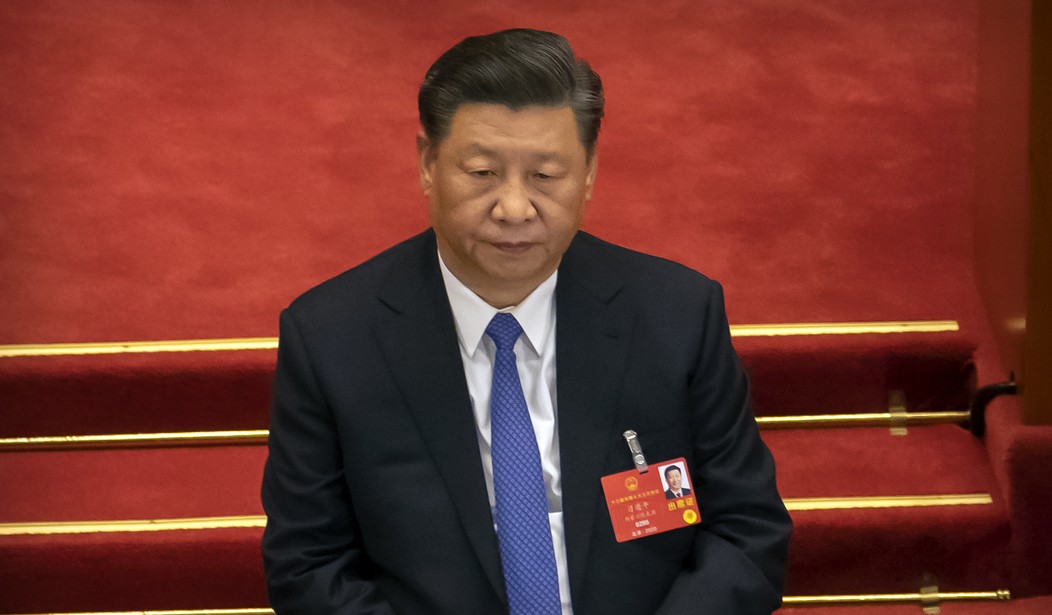On Tuesday, Chinese President Xi Jinping signed the “National Security Law” redefining crimes like secession, subversion, terrorism, and collusion with foreign powers in a way that better suits the Chinese Communist Party (CCP). The massive Hong Kong protests last year centered on opposition to this law, which likely undermines the agreement by which Britain ceded Hong Kong to China, establishing a “one country, two systems” regime. The text of the law has not yet been publicly released. Some protesters have warned about a coming “reign of terror” under the Chinese Communist Party.
In a video message to the United Nations Human Rights Council, Hong Kong Chief Executive Carrie Lam Cheng Yuet-ngor urged the international community to respect the CCP security law, the South China Morning Post reported. “I urge the international community to respect our country’s right to safeguard national security, and Hong Kong people’s aspirations for stability and harmony,” she said.
Lam insisted that the legislation would only target a small minority of people who had broken the law, and argued that it would not undermine the basic rights and freedoms of the overwhelming majority of Hong Kong residents.
The National People’s Congress Standing Committee in Beijing passed the law unanimously Tuesday, with Xi signing it shortly thereafter.
Chris Patten, the last British governor of Hong Kong, condemned the law in an interview with Bloomberg News.
“This is, in effect, an attempt to end ‘one country, two systems.’ It produces ‘one country, one system,'” Patten argued. He claimed the new law violated the “International Covenant on Civil and Political Rights, or the agreement that Hong Kong should have a high degree of autonomy.”
Patten also noted that Lam had supported the bill without even having seen it. “It’s absolutely crazy,” he said.
Beijing’s security law is “designed to ensure that the Hong Kong freedom and autonomy that we’ve regarded as being guaranteed until 2047 are being put on ice, got rid of, in order for the Chinese equivalent of the KGB to run Hong Kong however they want,” Patten argued.
Yet even those who will soon find themselves subjected to the law do not know the full extent of the changes to their liberties. “We don’t know because they haven’t told us, they haven’t told people in Hong Kong… we don’t actually know the detail of what they’re proposing yet,” the former governor added.
Patten insisted that “treason and terrorism and sedition and so on — those things are already made illegal” under existing Hong Kong law. “But they’re not made illegal in the way that China wants because China wants to be able to define those things in a way which runs counter to most views around the world on human rights. … What China wants … is the sort of law which would be unacceptable to people in Hong Kong because it would take away some of their basic freedoms.”
“It produces ’one country, one system.’”
Hong Kong’s last colonial governor Chris Patten says China’s new security law erodes the “one country, two systems” framework in place since the city’s handover to Chinese rule in 1997 https://t.co/eyVGNiCHXj pic.twitter.com/DZ9Man6Go7— Bloomberg (@business) June 30, 2020
‘Stand With Hong Kong!’ Where Is the Free World’s Reaganesque Response?
Chinese American lawyer and columnist Gordon G. Chang insisted that opposition in Hong Kong remains. He said the massive protests have “gone underground,” forming an “insurgency” to resist China’s oppression.
Don't congratulate yourself just yet, #China. The insurgency in #HongKong has just gone underground where it will hide until it is ready to strike. You are in for a long struggle. #NationalSecurityLaw https://t.co/7rECeLJX0y
— Gordon G. Chang (@GordonGChang) June 30, 2020
Pro-democracy leader Joshua Wong warned that the National Security Law heralds the “End of Hong Kong” and the “Beginning of Reign of Terror.”
“From now on, [Hong Kong] enters a new era of reign of terror, just like [Taiwan’s] White Terror period in history, with arbitrary prosecutions, black jails, secret trials, forced confessions, media clampdowns and political censorship,” Wong tweeted. “With sweeping powers and ill-defined law, the city will turn into a [secret police state]. [Hong Kong protesters] now face high possibilities of being extradited to China’s courts for trials and life sentences.”
3. With sweeping powers and ill-defined law, the city will turn into a #secretpolicestate. #HongKongProtesters now face high possibilities of being extradited to China’s courts for trials and life sentences.
— Joshua Wong 黃之鋒 😷 (@joshuawongcf) June 30, 2020
“However, even under the ill wind of [China’s] direct authoritarian rule, [Hong Kongers] will continue to fight for our freedoms and democracy for the city’s next generations. When justice fails, our fight goes on,” Wong added.
Citing danger to the lives of protesters, Wong announced he would resign as secretary-general of the Democratic Party of Hong Kong. “I would like to practice my beliefs as an individual. Hong Kong’s will not be undermined by the National Security Law or any bad law,” he declared.
He quoted Psalm 23:4: “I may walk through valleys as dark as death, but I won’t be afraid. You are with me, and your shepherd’s rod makes me feel safe.”
"I may walk through valleys as dark as death, but I won't be afraid. You are with me, and your shepherd's rod makes me feel safe." (Psalmes 23:4)
— Joshua Wong 黃之鋒 😷 (@joshuawongcf) June 30, 2020
President Donald Trump has not yet responded to China’s crackdown on Hong Kong. This move will only exacerbate tensions between the U.S. and Beijing. Following the revelations of China’s nefarious malfeasance in the coronavirus pandemic and the border scuffles with India, this move may herald a path toward war.
Tyler O’Neil is the author of Making Hate Pay: The Corruption of the Southern Poverty Law Center. Follow him on Twitter at @Tyler2ONeil.









Join the conversation as a VIP Member